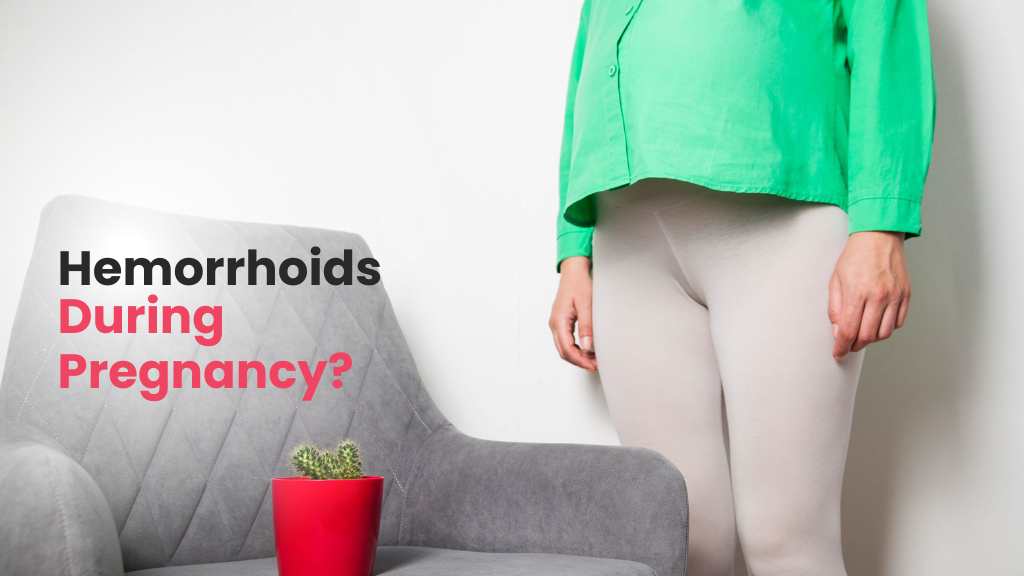
Table of Contents
Pregnancy is a beautiful journey, but it can also bring about certain challenges like physical discomfort with aches and pains. One common issue many pregnant individuals face is hemorrhoids. In this comprehensive guide, we will explore the causes, symptoms, prevention, and safe treatment options for hemorrhoids during pregnancy.
What are Hemorrhoids During Pregnancy?
Hemorrhoids during pregnancy are swollen and inflamed blood vessels in the rectal and anal areas that develop or worsen during a woman’s pregnancy. Sometimes called piles, these swollen blood vessels can cause discomfort, pain, itching, and sometimes bleeding, particularly during bowel movements.
The increased pressure on the pelvic region, hormonal changes, and constipation commonly contribute to the development of hemorrhoids in pregnant individuals. Managing and preventing hemorrhoids during pregnancy often involves lifestyle and dietary adjustments to alleviate symptoms and ensure a smoother pregnancy experience.
A study from 2022 found that progesterone is responsible for causing hemorrhoids during pregnancy. Progesterone relaxes the muscles in the walls of the blood vessels and intestines in your rear end, making them more likely to get hurt.
Types of Hemorrhoids During Pregnancy
Internal Hemorrhoids
Internal Pregnancy Hemorrhoids are like tiny lumps that form inside your bottom. They usually don’t hurt. Sometimes, you might have them and not even know it because they hide in your rectum where you can’t see them. But if one of these lumps slips out of your bottom, it can be really painful. This is called a prolapsed hemorrhoid. It can also make you bleed when you go to the bathroom.
External Hemorrhoids
External hemorrhoids during pregnancy are like bumps that appear on the outside of your bottom. They can be painful, and itchy, and make that area swell up. Sometimes, they might even bleed when they get irritated.
Causes and Risk Factors of Hemorrhoids During Pregnancy
– Increased Blood Flow
During pregnancy, hormonal changes, particularly the rise in progesterone, can lead to the relaxation of blood vessels and increased blood flow throughout the body. This can result in swollen blood vessels in the rectal area, making it more likely for hemorrhoids to form.
– Constipation
Hormonal changes can also affect the gastrointestinal system, slowing down bowel movements and causing constipation. Constipation can contribute to the development or exacerbation of hemorrhoids as straining during bowel movements puts pressure on the rectal veins.
– Weight Gain
Pregnancy often leads to weight gain, which can put additional pressure on the pelvic area, including the rectal veins. Hormones can influence weight gain, indirectly contributing to the risk of hemorrhoids.
– Relaxation of Muscles
Hormones like progesterone cause relaxation of smooth muscles, including those in the digestive tract. This relaxation can result in sluggish bowel movements and contribute to constipation, which, as mentioned earlier, is a risk factor for hemorrhoids.
– Increased Fluid Retention
Some pregnant individuals may experience increased fluid retention due to hormonal changes. This fluid retention can cause swelling throughout the body, including in the rectal area, which can make hemorrhoids more likely.
Symptoms of Hemorrhoids During Pregnancy
– Painful Bowel Movements
Hemorrhoids can make bowel movements painful, especially when they become irritated or inflamed. You may experience a sharp, throbbing, or burning sensation during or after passing stools.
– Blood in Stool or Toilet Paper
One of the hallmark symptoms of hemorrhoids is the presence of bright red blood in the stool, on the toilet paper, or in the toilet bowl. This bleeding typically occurs when the swollen blood vessels in the rectal area rupture or are irritated during a bowel movement.
– Itching or Irritation
Hemorrhoids can cause intense itching or irritation around the anus. This itching is often a result of mucus or fecal matter coming into contact with the swollen and sensitive tissue in the rectal area.
– Swelling Around the Anus
Hemorrhoids can lead to visible swelling or a lump around the anus. This swelling is caused by the engorgement of blood vessels in the rectal area and can be felt or seen externally.
IMPORTANT: While these symptoms are common indicators of hemorrhoids, they can also be associated with other medical conditions, such as anal fissures or more serious gastrointestinal issues. If you experience any of these symptoms, especially if they persist or worsen, we advise you to consult a healthcare professional for a proper diagnosis and appropriate treatment. They can determine the cause of your symptoms recommend the the fastest way to get rid of hemorrhoids during pregnancy and address any underlying issues.
Also read: Spotting or Bleeding During Pregnancy: What Could It Mean?
How To Treat Hemorrhoids During Pregnancy?
It’s kind of hard to completely avoid getting hemorrhoids during pregnancy. That’s because some of the stuff that causes them is important for a healthy pregnancy. But don’t worry, there are ways to deal with them.
Usually, the fastest way to get rid of hemorrhoids during pregnancy focuses on making the swelling go down, easing the pain, stopping the itchiness, and preventing or reducing constipation.
Sometimes, though, things can get a bit more complicated. If your pregnancy hemorrhoids get bad and have a blood clot inside them, you might need surgery. But don’t fret, if it comes to that, your doctor will send you to a specialist called a gastroenterologist. They’re experts at treating hemorrhoids and can even take them out with surgery if needed.
Again, the fastest way to get rid of hemorrhoids during pregnancy involves taking proactive steps like:
– Eating Fiber-rich Foods
Eating a diet rich in fiber can help soften your stools and promote regular bowel movements. Include plenty of fruits, vegetables, whole grains, and legumes in your meals. This can help prevent constipation, which is a significant risk factor for hemorrhoids.
– Taking Your H2O
Drinking an adequate amount of water is essential for softening stools and preventing constipation. Aim to drink at least eight cups of water a day, and more if you are physically active or live in a hot climate.
– Exercising Regularly
Engaging in moderate physical activity can help improve digestion and prevent constipation. Consult with your healthcare provider to determine the most appropriate exercise routine for your pregnancy.
– Not Straining
During bowel movements, avoid straining or pushing too hard. Straining can increase pressure on the rectal area and exacerbate hemorrhoid development. Take your time in the restroom and allow stools to pass naturally.
– Using Proper Toilet Habits
When using the toilet, try not to sit for extended periods. Additionally, use soft, unscented toilet paper, or consider using moist wipes to clean the anal area gently. Avoid using harsh or scented products that can irritate the skin.
When sitting on the toilet, consider placing your feet on a small stool or footrest to raise your knees higher than your hips. This can make it easier to have a bowel movement and reduce strain on the rectal area
– Doing Your Kegels
Kegel exercises, which involve contracting and relaxing the pelvic floor muscles, can help improve blood flow in the rectal area and reduce the risk of hemorrhoids.
– Not Heavy-lifting
Refrain from heavy lifting during pregnancy, as it can increase abdominal pressure and contribute to hemorrhoid development. If lifting is necessary, use proper lifting techniques, and ask for assistance when needed.
– Taking a Sitz Bath
Taking warm sitz baths can provide relief from hemorrhoid discomfort. This involves sitting in a few inches of warm water for about 15-20 minutes several times a day.
– Hydrocortisone Cream
You can buy this cream without a prescription. It’s like a superhero for your skin, reducing swelling, redness, and irritation around your rear end.
– Other Creams and Ointments
Ever heard of Preparation H? It’s like a magic trick for itching and discomfort caused by hemorrhoids. You can get it at the store or from your doctor if you need something stronger. Another option is Dibucaine ointment, which can also help with the pain.
– Witch Hazel Pads
These pads come pre-soaked with a substance that helps shrink hemorrhoids.
– Stool Softeners
If you’re having trouble in the bathroom, these can be a lifesaver. They make it easier to have a bowel movement. Just be sure to chat with your healthcare provider to make sure they’re safe for you.
– Cool Compresses
These are like a soothing hug for your sore behind. They can help reduce the swelling and discomfort caused by hemorrhoids during pregnancy.
Visit Your Nearest Medical Health Consultant
If you believe you have the above-mentioned symptoms, consult your healthcare provider. Don’t go trying to self-diagnose hemorrhoids on your own. Only a medical expert can recommend safe OTC remedies, prescribe medications if necessary, or provide some other guidance.
If you think you have external hemorrhoids during pregnancy, you can often just look and see. But if they’re on the inside, a doctor might need to do a rectal exam with their finger to check. In really bad cases, you might have to see a specialist called a colorectal surgeon or a GI specialist for a proper diagnosis.
Remember when you Google how to treat hemorrhoids during pregnancy, that hormonal changes and increased pressure on the pelvic area are common during pregnancy, making hemorrhoids more likely. While you can take steps to reduce the risk, it’s not always possible to prevent them entirely.
A Note for Our Readers
Dealing with hemorrhoids during pregnancy is not a walk in the park – they can be seriously uncomfortable. But here’s the silver lining: most of the time, they clear up on their own after you have your baby. So, don’t lose hope!
If you suspect you’ve got hemorrhoids or if they’re causing you a lot of trouble, don’t hesitate to get in touch with a healthcare provider. Some treatments can make a difference and help you feel better. You don’t have to suffer in silence!










